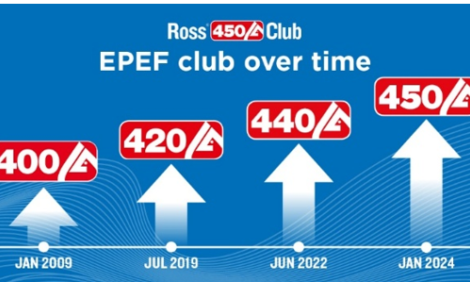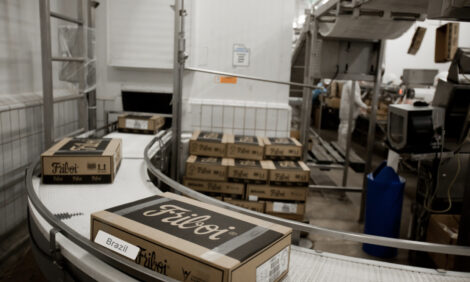



Trouw Nutrition to support feed safety and poultry performance in 2025
Following is a preview of Selko’s presence at IPPE 2025.Trouw Nutrition, Nutreco’s livestock feed business, is showing how science-based nutrition can deliver support across the poultry value chain during the International Production & Processing Expo (IPPE), 28-30 January in Atlanta, GA, USA. The company’s feed additives brand, Selko, is unveiling its newest feed safety tool, Mycotoxin Monitor, and sharing new poultry research to support flocks, feed production, and producers’ businesses. Selko is also presenting an International Poultry Science Forum (IPSF) talk that looks at water acidification to support broiler gut health and performance, and a scientific poster showing that a blend of free and buffered organic acids can help defend against Salmonella heidelberg entering the food chain at the slaughterhouse.
Interactive screens at Trouw Nutrition’s stand (A823) reveal findings from poultry studies conducted at its network of research centres around the globe. Visitors can learn about nutritional tools ranging from water acidifiers formulated with specific blends of organic acids to a proprietary phytogenic feed additive developed at Nutreco’s Garden of the Future, and trace minerals structured to maximise availability in the animal and minimise mineral excretion in the environment. Following is a preview of Selko’s presence at IPPE 2025.
Introducing Mycotoxin Monitor – helping assess mycotoxin risk and enhance analysis accuracy
Debuting at IPPE, the Mycotoxin Monitor analyses global data uploaded in real-time to support safety and quality assurance decisions on the farm and at the feed production facility. The tool generates easy-to-understand visuals revealing the mycotoxin contamination percentages and concentrations (ppb) for a select sample or sample group. Analysis can be performed for a specific country, continent, or time.
In addition, Mycotoxin Monitor assesses the risk that contaminated raw materials present to various species across distinct phases of animal feeding. Practical Mycotoxin Guidance Values (PMGV) assign a low, medium, or high risk, and help formulators make optimal use of raw materials across different animal growth phases. For example, differential risk can be estimated for sows, piglets, and growing phases of pigs. Because the Mycotoxin Monitor’s dataset is generated from multiple customers in a country, its enhanced sample size reduces sampling error without additional cost to individual producers.
TechTalk – Adding buffered organic acids to chlorinated water maintains quality and boosts performance
Water chlorination is a common practice for supporting water quality on the poultry farm. Adding organic acids to water can benefit bird health and performance parameters. Unlike blends comprised of free organic acids, a buffered blend can support chlorinated water quality without reducing birds’ water intake. However, depending on the buffer ingredient, there may be a chemical reaction with chlorine. Selko AlpHa is a blend of buffered organic acids, where the buffer ingredient is sodium formate. When applying sodium formate buffered organic acids in chlorinated water, free chlorine levels stay the same. Moreover, buffered organic acid blends have been shown to act in animals’ gastrointestinal tract to improve digestion and absorption of nutrients, supporting health and performance. During the IPPE TechTalk Selko’s Global Product Manager Gut Health Dr. Giseli Heim will also share findings from 20 trials conducted in 12 countries and involving 630,000 broilers. Improvements tracked in birds receiving Selko AlpHa included a 3% reduction in FCR and a 2.3% improvement in weight gain. During her remarks, Dr. Heim will provide actionable advice to help nutritionists tailor acidification strategies to chlorination practices on the farm.
Effective growth promoting strategy in an AGP-free production system
As producers in Asia reduce the use of antibiotic growth promoters, a Selko oral presentation will review findings from a meta analysis involving two studies conducted in the region. These studies examined the health and performance effects of a synergistic blend of free and buffered organic acids (Selko AlpHa) applied to water. The findings suggest that providing birds with organic acids support improves body weight, average daily gain, and feed conversion ratio without reducing feed and water intake. “These studies confirm that water acidification can be an effective tool for supporting flocks’ health and performance,” said Dr. Heim. “During IPPE, Selko looks forward to showcasing solutions that can support producers operating under different regulatory schemes and in different production environments.”
Reducing recontamination risk at the slaughterhouse
Salmonella Heidelberg poses a particular concern for human health given its resistance to some antimicrobials used in human medicine. A Selko scientific poster will review a trial conducted by University of São Paulo (USP) in Brazil that assessed how a blend of free and buffered organic acids (Selko AlpHa) reduced the risk of S. Heidelberg from entering the food chain via the slaughterhouse.








